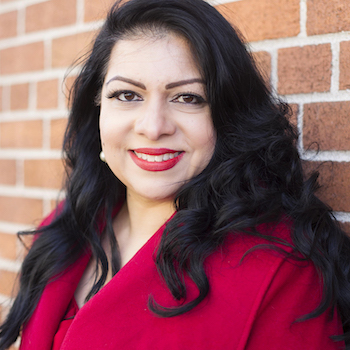It has been nearly 18 years since the al-Qaida attacks of September 11, 2001 – a young person’s lifetime.
For young Canadian Muslims, the "war on terror" that ensued has shaped their lives, identities and behaviours – often more than they realize, says Jasmin Zine, a Wilfrid Laurier University professor with the departments of Sociology and Religion and Culture.
With funding from the Social Sciences and Humanities Research Council of Canada (SSHRC), Zine has spent six years studying what she calls the 9-11 generation of Muslim youth in Canada. She is now nearly finished writing a book on these young people and how Islamophobia has affected them.
"These youth are often branded as potential radicals and terrorists so I’m interested in the impact that has on them," says Zine, who with her research assistants interviewed 130 Muslim youth from across Canada, aged 17 to 25, representing many different ethnic groups and walks of life.
"This is the first in-depth study like this in Canada with this many participants."

- Jasmin Zine
Today's young Muslims have grown up with an unprecedented level of surveillance, says Zine, who teaches in Laurier’s Muslim Studies Option. The RCMP and CSIS keep tabs on Muslim student groups and border officials subject Muslims to greater scrutiny than others.
"This is a generation of youth that doesn’t know a world before 9-11 so, for them, a lot of what they experience is just normal," Zine says. "One of the things I’ve found is that they internalize the level of surveillance they’re experiencing so they become self-surveilling."
This means young Muslims are highly aware of what they say and do in general and hyper-aware in situations such as border crossings, Zine says.
"One of the student groups I talked to said, 'We were going to go up north and play paintball but we decided not to do that because we don’t want to be seen as a terrorist cell,'" says Zine. "Others said things like, ‘We don’t play violent video games where people can see us because we don’t want to be seen as violent or planning an attack.’ And yet what they’ll tell me when I ask if 9-11 affected them is often, ‘No, it didn’t.'"
Despite the pervasive surveillance, radicalism is extremely rare, Zine says. Of the many youth she and her assistants spoke with, only one expressed that he had formerly held radical Islamist views.
If anything, many young Muslims make a point of conspicuously being good citizens because they feel they must serve as representatives of the nearly two billion Muslims in the world, Zine says.
"Because they bear this burden of representation, they’re very cognizant of being or performing the 'good Muslim' to work against the stereotype.
"They do this because they want to be good people and it’s consistent with Islamic values, but they’re also very attuned to the optics of it. It will help people see that, 'I’m not a threat; I am a good citizen; you don’t need to be afraid of me.'"
Both male and female Muslim youth face the suspicion of radicalism, but women and girls who wear veils also face the contradictory assumption that they’re “somehow backward and oppressed, without agency,” Zine says.
The debate over what women wear has played out publicly. The previous federal Conservative government moved to ban face veils in citizenship ceremonies and the Quebec government has moved to ban overt religious symbols in the public service, legislation many understand as targeting Muslim women.
Measures such as these not only fail to empower Muslim women, they, like surveillance efforts, alienate Muslim youth, says Zine. What’s more, both types of measures tend to promote Islamophobia and embolden white supremacists, who represent a much bigger threat in Canada than radical Islamists, Zine says. Islamophobia and radical Islam then feed off each other in a vicious cycle.
"Islamophobia is the breeding ground for radical Islamist groups. It makes it very easy for them to recruit foreign fighters by saying, ‘The West is your enemy,’” Zine says. “However, while there have been some incidences of Muslim youth going abroad and becoming foreign fighters, the number is small in contrast to the heightened notion of threat."
Despite the time since the 9-11 attacks, opinion polls and hate crime statistics indicate Islamophobia is on the rise, says Zine, citing the 2017 mosque shooting in Quebec in which white supremacist Alexandre Bissonnette killed six and injured 19.
"With the rise of right-wing populism and the so-called alt-right, we’re seeing a lot more anti-Muslim rhetoric and groups that are specifically about Islamophobic hate and violence are gaining traction," Zine says.
However, Muslim youth are combatting Islamophobia in a variety of ways. Some are using the arts to encourage understanding, as Zine is documenting for her book. Her son, Yusuf Zine (BA’15, MA ’16), for one, has produced a play and documentary, I Am Rohingya: A Genocide in Four Acts, about the persecution of a Muslim minority in Myanmar.
Muslims and non-Muslims are using research to shed light on Islamophobia. Zine recently received a separate SSHRC grant to lead a team of graduate students in examining what she calls the Canadian Islamophobia industry, work that will be done in partnership with the National Council of Canadian Muslims.
"It’s called an industry because in the U.S. they’ve been able to map a constellation of various organizations, media groups, politicians, think tanks and individuals who are accessing multi-millions of dollars to actively promote and purvey Islamophobia," Zine says.
Zine is also interested in examining organized Islamophobia and surveillance globally and is applying for funding to extend her research to Myanmar, China and India. As with her research on Muslim youth, she plans to involve community and academic partners. Her output won’t be confined to academic journals.
"Our work has to be intelligible and translate beyond the ivory tower," Zine says. "I want my work to connect with communities and be meaningful to the people who are being affected by Islamophobia and discrimination."